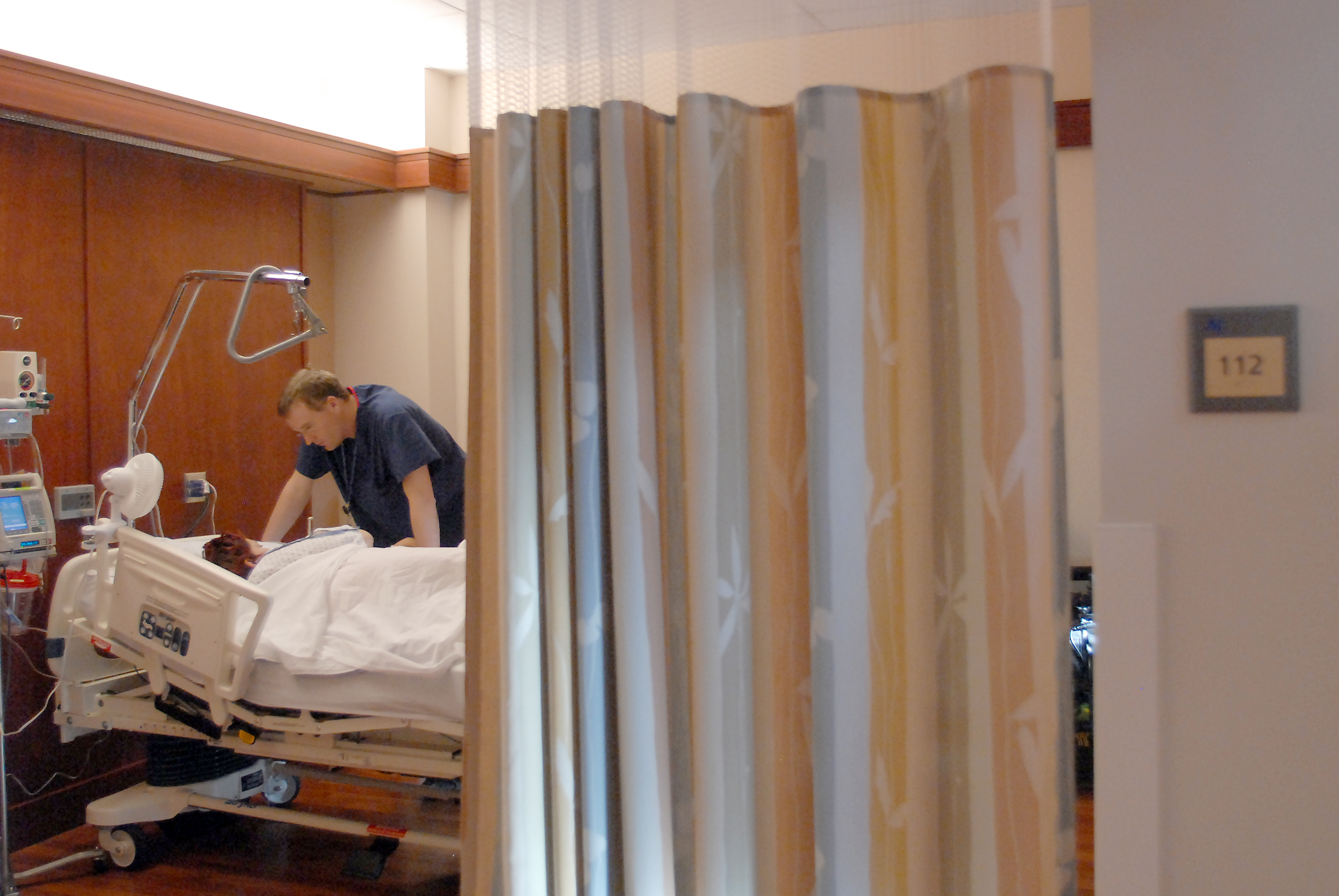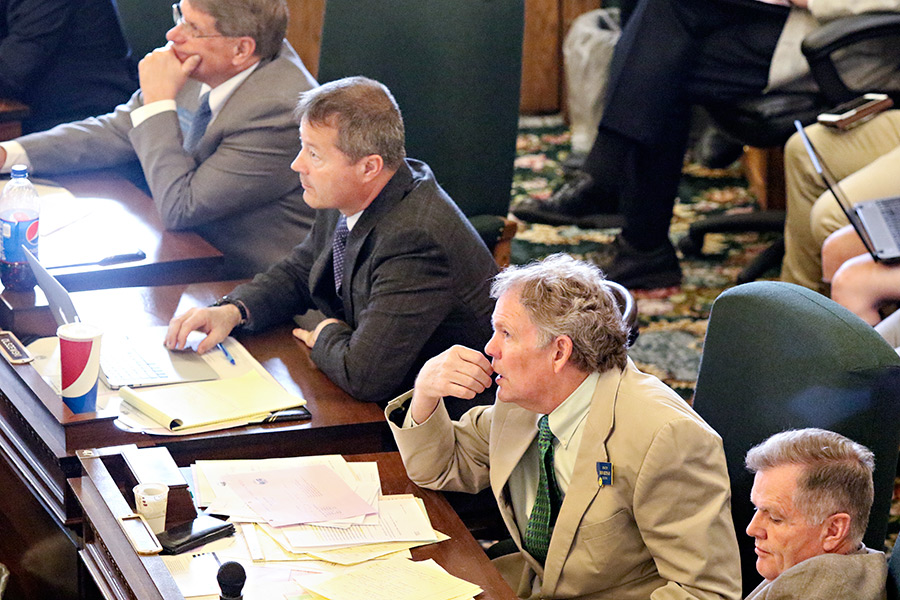A legislative commission tasked with mending Montana’s broken behavioral health system is bringing its statewide tour to Kalispell this week, where lawmakers, healthcare providers and local stakeholders will lay bare the challenges straining behavioral and mental health services in the Flathead Valley, and across the state.
The Behavioral Health Systems for Future Generations Commission, chaired by Bigfork Republican Rep. Bob Keenan, was created during the 2023 legislative session and was born out of years of cuts and closures at the state’s public and private behavioral health facilities.
Shrinking budgets, increased demands for services and skyrocketing costs have forced numerous mental health providers to shut their doors in recent years, putting pressure on the Montana State Hospital in Warm Springs and local detention centers while leaving many patients with nowhere to turn. In recent years, 125 beds in Montana group homes have closed, as well as 31 voluntary and involuntary crisis beds in Bozeman, Butte and Polson that were formerly managed by the state-funded Western Montana Mental Health Center.
Wait times for court-ordered mental health facilities have increased. Children experiencing behavioral health challenges have been forced to move out of state to seek care, given a lack of options in Montana. The criminal justice system is overwhelmed with incarcerated people experiencing mental health conditions that it is unable to treat.
“Mental health is everywhere,” Keenan said, discussing the challenges facing the system, their implications for families across Montana and his goals for the commission’s work. “People don’t pay attention to this on a day-to-day basis. They’re trying to get through the traffic signals of life, make a living, get their kids to school, and get their kids fed and put to bed. I hope that if and when they ever need this kind of help, it’ll be there.”
The major culprit driving the closure of such facilities has been stagnant reimbursement rates for providers that care for patients on Medicaid. A 2022 study commissioned by the state and conducted by private consulting firm Guidehouse found that Montana’s reimbursement rates for Medicaid patients failed to cover the average cost of care. As of earlier this year, the Medicaid reimbursement rate for adult behavioral health services only covered 85% of costs. The number was 88% for children’s mental health services and 80% for developmental services.
While the Legislature and Gov. Greg Gianforte raised Medicaid reimbursement rates earlier this year, meeting 100% of the identified gap by 2025 to the tune of $339 million, work remains as the state seeks to increase access to services and build a sustainable infrastructure for the future of behavioral healthcare.
For Keenan, whose 11 terms in the Legislature have been defined in part by his work on mental health, the collapse of the state’s behavioral healthcare system can be traced back to 2017, when major budget cuts passed during a special legislative session slashed $49 million from the budget of the Montana Department of Public Health and Human Services (DPHHS). Programs from crisis stabilization to the state hospital lost funding, and Medicaid providers saw reimbursement rate reductions, which hindered their ability to deliver care to the state’s most vulnerable residents. In the six years since the cuts, the landscape of care has only become sparser.
“Once upon a time, we seemed to be handling this pretty well,” Rep. Dave Fern, a Whitefish Democrat and one of the six state lawmakers serving on the commission, said, calling the cuts in 2017 “a touchstone moment.”
“We had a special session in 2017. We ran out of money for a little while. We had to make adjustments,” Fern said. “But, we allowed those reductions to prevail.”
The governor’s office this winter asked Keenan to carry a bill that would invest $300 million from the state’s budget surplus into the deteriorating behavioral health system. The bill allowed for the creation of the nine-person commission and tasked the commission with providing a report to the governor’s office by July 2024 with recommendations for solutions.
Gianforte’s office, Keenan said, needed “a blueprint.” He said the executive branch tasked him with setting “up a commission to study, inventory, catalog what we have going on, good or bad, and build from there.”

After House Bill 872 passed through the Legislature, Keenan recruited a coalition of Republican and Democratic lawmakers to join him on the commission, selecting Fern; Rep. Michele Brinkley, R-Hamilton; Rep. Mike Yakawich, R-Billings; Sen. John Esp, R-Big Timber; and Sen. Ellie Boldman, D-Missoula.
Gianforte appointed DPHHS Director Charlie Brereton, Flathead Industries CEO Patrick Maddison and Janet Lindow, executive director and co-founder of the Rural Behavioral Health Institute, to join the lawmakers on the commission.
Since its first meeting on July 20, the commission has traveled across Montana, hearing from mental health providers, law enforcement officers, nonprofit administrators, tribal officials and families who have been impacted by the state’s dysfunctional care system. The commission is tasked with providing a set of recommendations to the governor for mending the broken system, as well as allocating the $300 million, which will be used to finance local programs, reopen shuttered facilities and tackle roadblocks ranging from licensure to workforce challenges.
Already, the commission has adopted two recommendations for consideration by the governor: addressing the backlog of court-ordered mental health evaluations across the state and increasing residential bed capacity for behavioral health and developmental disability service providers, both adult and adolescent.
“We have done incredible work over the last 25 to 30 years to reduce the stigma of mental health. It’s not something that people have blinders on to anymore. It happens. It happens in a lot of families, and it’s okay to ask for help. It’s okay to have situations like this come up,” Keenan said.
On Thursday and Friday, the nine commission members will gather in Kalispell, a home game for both Keenan and Fern, to discuss developmental disability services and the unique problems faced by the Flathead Valley.
During the Kalispell meeting, which will take place at Flathead Valley Community College, the commission will hear from local stakeholders during panels on early intervention services, adult developmental disabilities, crisis services for children and “lived experiences,” an additional panel that Keenan said is critical in considering the voices of family members impacted by systemic failures.
“I insist upon bringing people into the discussion,” Keenan said. “We’ll have individuals who have experienced the developmental disability system and/or families that have had experiences — good, bad, doesn’t matter.”
Both Keenan and Fern said that a confluence of factors have pushed behavioral health into the spotlight in the Flathead Valley, where conflicts between homeless service providers and elected officials have grown increasingly contentious and where a 60-year-old unhoused man was murdered by a Kalispell teenager in June.

Fern said that homeless service providers estimate that about 80% of their unhoused clients in the Flathead Valley are dealing with mental and behavioral health conditions.
Keenan added the commission has seen support from Flathead County Sheriff Brian Heino, Flathead County District Court Judge Amy Eddy and Flathead County Jail Commander Jennifer Root, all of whom are familiar with the interactions between the criminal justice and behavioral health systems.
During the July meeting, Eddy told the commission that the judicial system has been strained by the failures of the state’s behavioral health infrastructure. The judge said that the judicial branch relies on state behavioral health services for mental health evaluations, involuntary commitment proceedings and competency restoration, processes that have been delayed due to an increase in demand and inadequate services.
“That is a key piece, I believe, of where we could interact with the commission,” Eddy said of competency restoration proceedings. “Those restoration proceedings can only be done at a DPHHS facility. It requires people to be sent to the state hospital, which obviously has a well-publicized and documented limitation of services.”
As the commission prepares for its visit to the Flathead, Keenan and his team have called the meeting an “opportunity to weigh in on how we can best assist communities and lay the foundation for multi-year reform.”
“We encourage all Montanans to join us and make your voices heard as more recommendations are brought forward. Our work is only beginning. Together, we can use this investment to help our neighbors in need – both now and for future generations,” Keenan, Brereton and Esp wrote in a Nov. 7 guest column in the Beacon.
The Kalispell meeting will take place from noon to 5:30 p.m. on Thursday, Nov. 30 and 9 a.m. to 1 p.m. on Friday, Dec. 1 at the Flathead Valley Community College Arts & Technology building in room AT-139. The Zoom link for Thursday can be found here, and the link for Friday can be found here. Public comment will be encouraged at the meeting. More information about the commission can be found at futuregenerations.mt.gov.
“It’s going to be a nebulous, systemic change to most people until it comes to them in their neighborhood, in their community or in their family.” Keenan said about the commission’s work. “Then they will go, ‘Oh.’ Then you get to the point of: Who do you call? Who responds? And where do you go for help?”
This post was originally published on this site be sure to check out more of their content.




